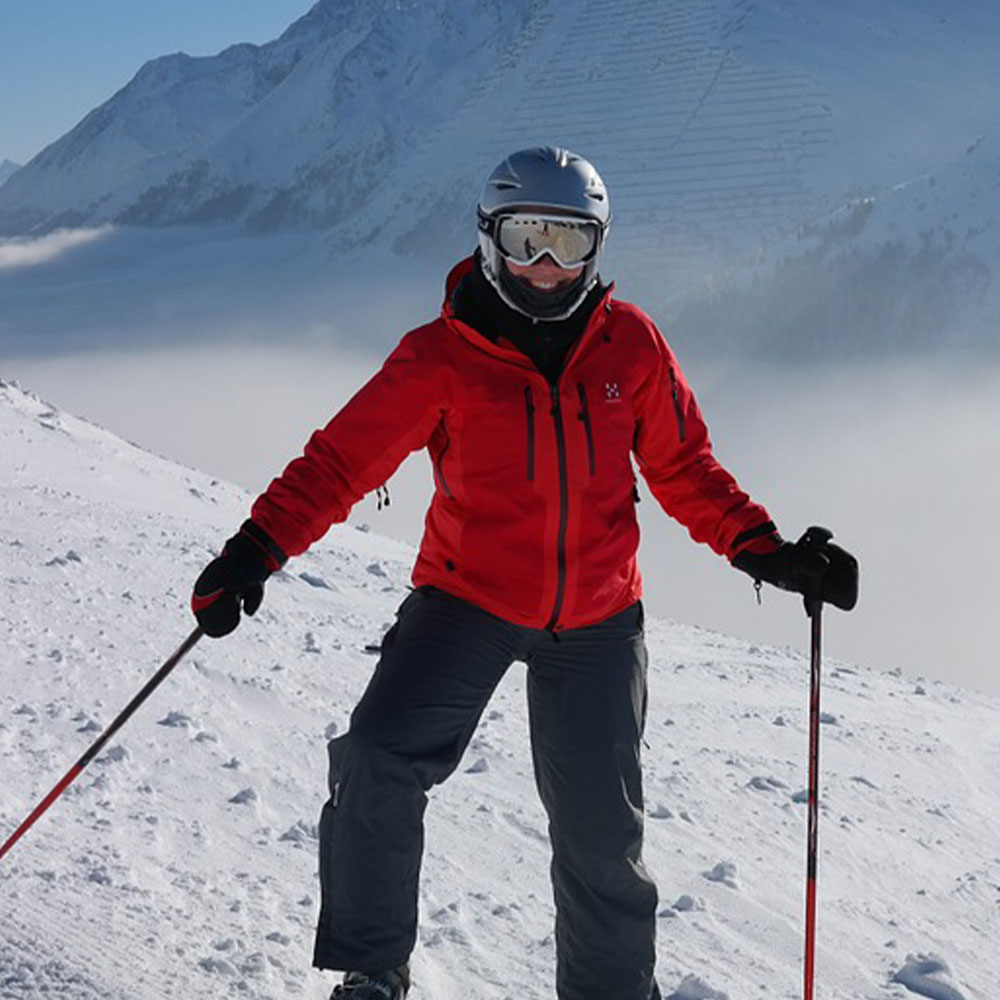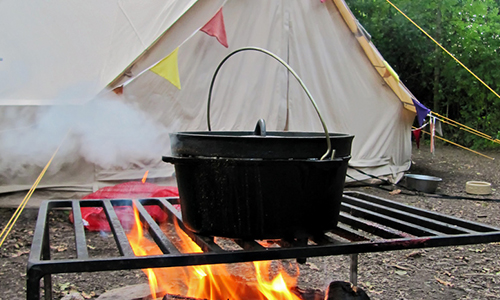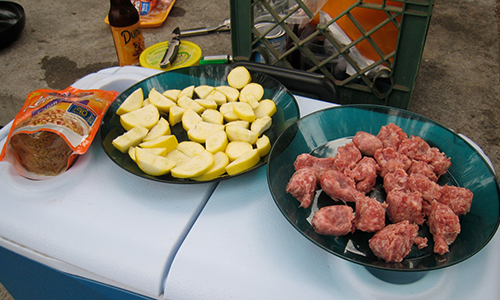Eat Like a Foodie While Camping
Author

A keen runner, skier and nuts about cycling. Karl lives in Cumbria, where he loves encouraging his two children to follow in his outdoor lifestyle. Whilst out and about keeping active, Karl keeps a diary and shares it with Outdoor Look.
 Good food can make your camping trip better than having to survive on cold snacks in the wilderness. With the right items in your backpack and knowledge of how to prepare them, you can eat like a king even in the middle of nowhere.
Good food can make your camping trip better than having to survive on cold snacks in the wilderness. With the right items in your backpack and knowledge of how to prepare them, you can eat like a king even in the middle of nowhere.
Here are some tips that you can consider while planning a camping expedition:
Right Equipment is the Key:
You need some basic gear to prepare a meal at the campsite. If you are on a car camping trip, you get the flexibility of carrying a large camping stove and a set of utensils for cooking conveniently. While the backpackers can only carry a compact camping stove, one with the simmer control is preferable, and a few utensils like fork and spoons.
If you prefer cooking over the campfire, you should pack a grill grate and aluminium foil to wrap around your food.
Meal Tips for Car Campers:
Car campers have the advantage of not having to carry the luggage on their shoulders. If you are planning a car camping trip you can carry perishable items like meat, eggs, and vegetables in a cooler. Store the food at a temperature below 40-degree Fahrenheit to keep the items preserved. Keep raw meat in watertight containers to prevent any contamination.
Some of the meals you can easily prepare are: sausage and pepper sandwiches, hamburgers and hot dogs, foil packet meals, burritos, and Mason jar salads.
Dehydrated Meals:
If you are worried about having to prepare an elaborate meal on the campsite or the extra weight you would need to carry, you can go for dehydrated meals.
Pre-made dehydrated food packets are easily available in the market. But if you want to avoid the excess sodium and unwanted ingredients, you can dehydrate the food on your own. A dehydrator with a fan will allow you to easily prepare your campsite meals.
You can cook full meals and then dehydrate them or pre-cook, dehydrate and store the ingredients separately. You would need to soak the food items in water for three to four hours to reconstitute them.
Supplements:
If you are planning a trekking expedition of more than a week, it is recommended that you carry the supplements to replenish the vitamins and minerals in your body. Probiotics, fish oil, protein powder and electrolytes are the four supplements every long-distance backpacker must carry.
Snacks:
 You cannot always prepare your favourite meal on a campsite and sometimes the weather condition can prevent you from cooking even a basic meal. You can stack up on granola bars, apples, nuts, dry fruits, chocolate bars, tuna cans, instant oatmeal, tuna packets and hummus. These food items can be consumed separately or can be combined for a sumptuous meal.
You cannot always prepare your favourite meal on a campsite and sometimes the weather condition can prevent you from cooking even a basic meal. You can stack up on granola bars, apples, nuts, dry fruits, chocolate bars, tuna cans, instant oatmeal, tuna packets and hummus. These food items can be consumed separately or can be combined for a sumptuous meal.
Food Safety:
Hygiene is a must whether you are at home or at a campsite. Follow the prevalent drill – wash your hands before handling food and after handling raw meat, use separate utensils for vegetables and raw meat, and wash everything before storing them after use.
Plan for having healthy meals while camping so you do not deplete your body of important nutrients. Make sure you don’t forget the spices that are important to add a taste to your meals. Think simple, nutritious and out of the box and enjoy sumptuous meals even while camping.
Author

A keen runner, skier and nuts about cycling. Karl lives in Cumbria, where he loves encouraging his two children to follow in his outdoor lifestyle. Whilst out and about keeping active, Karl keeps a diary and shares it with Outdoor Look.
Categories
- Sport (28)
- Product Reviews (3)
- Team Outdoor Look (7)
- Mike Wild (2)
- Mike Payton (2)
- Suse Hammond-Pears (3)
- Snowboarding (12)
- Latest Offers (105)
- Shop Talk (1)
- Competitions (7)
- Walking (413)
- Lifestyle Fashion (8)
- Travel (86)
- Kit Guides (176)
- Workwear Clothing (6)
- Safety Workwear (4)
- Health/Fitness (289)
- Skiing (91)
- Great Outdoors (1316)
- Cycling (92)
- January 2025
- December 2024
- November 2024
- October 2024
- September 2024
- August 2024
- July 2024
- June 2024
- May 2024
- April 2024
- March 2024
- February 2024
- January 2024
- December 2023
- November 2023
- October 2023
- September 2023
- August 2023
- July 2023
- June 2023
- May 2023
- April 2023
- March 2023
- February 2023
- January 2023
- December 2022
- November 2022
- October 2022
- September 2022
- August 2022
- July 2022
- June 2022
- May 2022
- April 2022
- March 2022
- February 2022
- January 2022
- December 2021
- November 2021
- October 2021
- September 2021
- August 2021
- July 2021
- June 2021
- May 2021
- April 2021
- March 2021
- February 2021
- January 2021
- December 2020
- November 2020
- October 2020
- September 2020
- August 2020
- July 2020
- June 2020
- May 2020
- April 2020
- March 2020
- February 2020
- January 2020
- December 2019
- November 2019
- October 2019
- September 2019
- August 2019
- July 2019
- June 2019
- May 2019
- April 2019
- March 2019
- February 2019
- January 2019
- December 2018
- November 2018
- October 2018
- September 2018
- August 2018
- July 2018
- June 2018
- May 2018
- April 2018
- March 2018
- February 2018
- January 2018
- December 2017
- November 2017
- October 2017
- September 2017
- August 2017
- July 2017
- June 2017
- May 2017
- April 2017
- March 2017
- February 2017
- January 2017
- December 2016
- November 2016
- October 2016
- September 2016
- August 2016
- July 2016
- June 2016
- May 2016
- April 2016
- March 2016
- February 2016
- January 2016
- December 2015
- November 2015
- October 2015
- September 2015
- August 2015
- July 2015
- June 2015
- May 2015
- April 2015
- March 2015
- February 2015
- January 2015
- December 2014
- November 2014
- October 2014
- September 2014
- August 2014
- July 2014
- June 2014
- May 2014
- April 2014
- March 2014
- February 2014
- January 2014
- December 2013
- November 2013
- October 2013
- September 2013
- August 2013
- July 2013
- June 2013
- May 2013
- April 2013
- March 2013
- February 2013
- January 2013
- December 2012
- November 2012
- October 2012
- September 2012
- August 2012
- July 2012
- June 2012
- May 2012
- April 2012
- March 2012
- February 2012
- January 2012
- December 2011
- November 2011
- October 2011
- September 2011
- August 2011
- May 2010
- April 2010
- March 2010
- February 2010
- January 2010
- November 2009
- October 2009
- September 2009
Submit a Comment